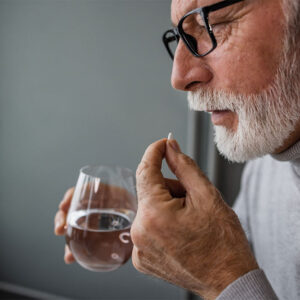
[Alert] THIS Drug is KILLING Seniors!
My grandfather used to say, “If it’s not one thing, it’s another.”
That’s certainly the case with modern medicine – especially when it comes to mainstream drugs.
You get a diagnosis for a condition, take a drug to treat it, and then end up with another (often deadlier) condition as a result of the drug you’re taking the treat the initial problem.
Case in point: A study finds that a popular drug taken by thousands of seniors can send your risk of cancer skyrocketing.
And it could be in your medicine cabinet right now!You might not realize just how important your thyroid gland is… until it stops functioning properly.
An overactive thyroid – called hyperthyroidism – can leave you feeling fatigued, hot, irritable, and sleepless, along with giving you heart palpitations, diarrhea, and more.
All of these symptoms occur as a result of an enlarged thyroid.
The most common treatment for hyperthyroidism is radioactive iodine. You take it by pill, and the cells in your thyroid absorb the radiation, which destroys them in the process.
Radioactive iodine is considered to be the most reliable cure for the condition, but it actually destroys your thyroid gland in the process.
Predictably, this leads to hypothyroidism… an underactive thyroid. When that happens, you’ll need to take thyroid hormone replacement therapy for the rest of your life.
And just like that, you become a customer for life.
And that’s not even the worst problem with this “best” option for hyperthyroidism.
According to a study recently published in JAMA Internal Medicine, people who received radioactive iodine to treat their hyperthyroidism have an increased risk of dying from cancer… especially breast cancer.
After analyzing 19,000 people, the researchers found that for every 1,000 people treated using the standard dosage, 20 to 30 solid tumor deaths would occur as a result.
That’s because while the thyroid gland absorbs most of the radiation, there is still some radiation that reaches the surrounding tissues, like the breast and stomach.
And it turns out that the more radiation an organ absorbed, the higher the risk of lethal cancer developing at that site.
This relationship was especially strong for breast cancer.
Since 1.2% of the population has hyperthyroidism – and since women are more likely to have it than men – this represents a critical piece of information that women need to know if they want to avoid developing breast cancer. Especially since hyperthyroidism can often be managed through diet and supplementation.
Regarding diet, it’s critical to avoid foods high in iodine, which include iodized salt, seafood, egg yolks, and eating lots of chicken, beef, or grains.
Evidence has shown that supplements like L-carnitine and selenium can help combat the effects of hyperthyroidism.
In fact, one study even showed that L-carnitine can reverse symptoms as severe as heart palpitations, tremors, and fatigue.
Oh, and they won’t increase your risk of cancer in the process.
Written By Dr. Richard Gerhauser, M.D.
For years he’s been the trusted doctor for celebrities, world-class athletes, and countless seniors looking to reclaim their health.
And now…for the first time ever… he’s making his medical breakthroughs available to readers all across America.
Dr. Richard Gerhauser, M.D. is one of the most pioneering and innovative minds in medicine today – and he delivers cutting-edge cures each month through his Natural Health Response newsletter.
Natural Health Response readers get full access to Dr. Gerhauser’s protocols for chronic pain… heart disease… diabetes… Alzheimer’s… and even cancer. These are the very same treatments Dr. Gerhauser recommends to his own patients at his practice in Tucson, Arizona.
In addition to being a board-certified medical doctor, Dr. Gerhauser has earned two master’s degrees and has served as a clinical professor at the University of Arizona.
And as a physician at the world-famous Canyon Ranch, Dr. Gerhauser treated celebrities from around the world who paid dearly for the type of next-generation health information he provides Natural Health Response readers each month.
View More Free Articles
Mother Nature's Bone-Building Secret REVEALED
Mainstream medicine has peddled the same old song and dance about osteoporosis for years. Pop some calcium pills… do some jumping jacks… and cross your fingers that your bones don’t crumble like a stale cookie. But what if I told you Mother Nature has been hiding a bone-building secret right under our noses? And we […]
The INCREDIBLE Payoff for Delaying Diabetes
If you don’t know where your blood sugar levels stand, it’s time to get them checked. It’s estimated that one in three adults has prediabetes, yet 80 percent of these folks have NO IDEA they’re in this category. That’s a BIG problem because most people will develop type 2 diabetes within just five years of […]
The Biggest Dementia Risk Factor REVEALED
I’m sure you’re familiar with the Skeleton Dance song… “The foot bone is connected to the leg bone. The leg bone is connected to the knee bone…” It’s easy to think of our bones being linked because we can physically see them. What’s less obvious is that everything else about your health is JUST as […]
It's NEVER Too Late to Kick This Dangerous Habit
You’ve heard it a million times before: “Smoking is bad for you.” If you’re still lighting up, I bet you remember a time when smoking wasn’t just accepted—it was downright fashionable. Remember when you could smoke in restaurants, on airplanes, and even in hospitals? Heck, movie stars even made it look cool and sophisticated. Well, […]
The TRUTH About ED No One's Talking About
It’s a subject most men would rather sweep under the rug… erectile dysfunction (ED). But you’re not alone if you’re having trouble in the bedroom. In fact, ED affects up to 30 million men in the U.S. alone. However, popping a little blue pill isn’t the answer. ED drugs are often just slapping a Band-Aid […]
Don’t Let Muscle Loss RUIN Your Golden Years
For older women, muscle mass can take a nosedive after menopause. This means more than trouble carrying in the groceries. Over time, the decline in muscle mass can lead to mobility problems, balance problems, falls, and ultimately a loss of independence. Staying active is a critical piece of the puzzle. But now, researchers have discovered […]
The Bad Habit Causing Lupus
All autoimmune diseases are on the rise—but lupus is one of the worst. When the condition strikes, your immune system starts to attack healthy tissues. Lupus cases have increased by 60 percent in women and have increased six-fold in men over the past four decades. What’s driving this dramatic increase? Well, we might have found […]
SHOCKING Missing Piece of the Diabetes Puzzle Discovered
I’ve been saying for years that there’s MORE to type 2 diabetes than your weight—or even your diet. Sure, they play their part. But unless you’re adding in THIS missing piece of the puzzle, you could be increasing your risk of type 2 diabetes despite your best efforts to avoid it. And you’ll never guess […]
Ditch the Chips and DEFY Aging
Sometimes, you just want something to crunch on. The craving can send even the most health-conscious among us heading straight to the snack aisle. But before you reach for the potato chips—which can contain all kinds of harmful ingredients—I have a better idea. Try THIS crunchy, healthy snack instead of loading up ingredients that can […]
Is Aspirin DEADLY? (Get the Truth Here)
Old habits die hard… especially when we’ve been led to believe they’re good ones. We were told for years that taking an aspirin a day would lower the risk of heart attack and stroke. But for many, those were empty promises that came with a LOT of risk… and LITTLE reward. That’s why, if you’re […]










